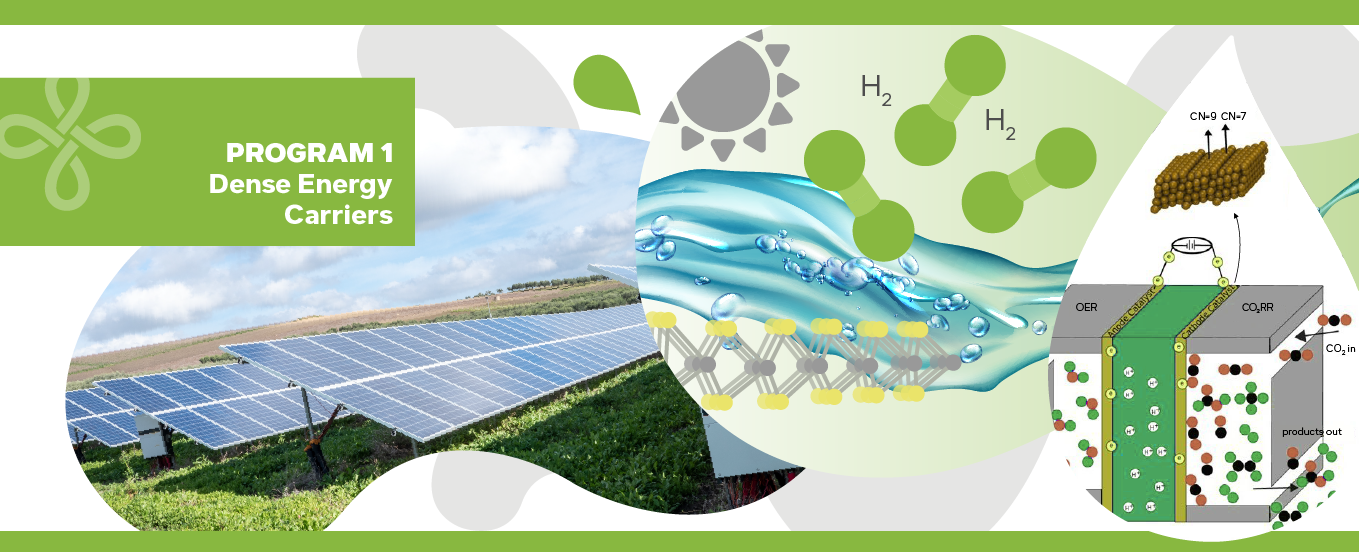Dense Energy Carriers

Principal Investigator (PI)
Ana Flavia Nogueira – UNICAMP – Chemistry Institute – anafla@unicamp.br
Co-PIs
Claudia Longo – UNICAMP – Chemistry Institute – clalongo@unicamp.br
Ernesto C. Pereira – UFSCar – Chemistry Department – ernesto@ufscar.br
Flávio Leandro de Souza – UFABC – flavio.souza@ufabc.edu.br
Pablo Sebastián Fernández – UNICAMP – Chemistry Institute – pablosf@unicamp.br
________
Publications
See publications list.
________
Molecules offer the highest energy densities compared to any form of electricity storage and are therefore referred to as dense energy carriers (DEC). However, most of the molecules used as fuel nowadays are processed through non-renewable and non-sustainable technologies or by biofuels technologies.
CINE’s DEC Division was proposed to make use of the Sun, a clean and abundant source of energy, to shape a more sustainable and prosperous future. We intend to achieve this very noble objective through the development of efficient and low-cost processes and photocatalysts able to convert sunlight to electricity, to break water, CO2 and biomass into more valuable products as hydrogen, alcohols, hydrocarbons and other C2+ molecules, etc.
Certainly, solar driven routes to synthesize molecules based on the photoelectrochemical (PEC) approach are alternative ways to be explored in order to produce liquid fuel in a sustainable and “green” concept. Therefore, the focus of this research division is the development of efficient solar driven routes to synthesize relevant solar fuels from molecules that are widely available in the environment.
DEC Division has also aimed to make the usage of in situ and operando techniques (coupled or not with Synchrotron radiation) to understand about the mechanisms of charge generation, separation and transport, and how the nature and properties of the photocatalysts change during operation.
Emerging materials as halide perovskites are also being explored to develop efficient photovoltaic cells. We propose to study the fundamentals of the halide perovskite materials as defects, stability, composition, performance and to develop large area solar modules to be coupled to the PEC systems.
________
Projects
Co-PI: Ernesto C. Pereira – UFSCar – Chemistry Department – ernesto@ufscar.brThe main objective of this project is the synthesis of functional materials of oxides, selenides and sulfides with composition control, microstructure, film thickness and morphology, which will be produced by low cost and high efficiency photoelectrochemical reactions. Besides, fundamental investigation of reaction using both experimental and computational methods will be developed. As the main focus synthesis aims at the control of these properties, it is expected to correlate the appropriate characteristics of each of the materials with their photoactivity. Thus, the objective is to significantly improve the photoelectrocatalytic properties of these materials, either by increasing the photocurrent, which in the literature has a range between 0.01 to 3.0 mA cm-2, or by increasing the stability of the material.
Co-PI: Ana Flavia Nogueira– UNICAMP – Chemistry Institute – anafla@unicamp.brThis project aims at the development of efficient solar cells based on halide perovskites with multications in order to assist the photoelectrochemical processes of hydrogen generation from the water and reduction of carbon dioxide. The project also includes (i) physicochemical and structural studies of this class of semiconductors as defects, stability, composition, formation mechanisms, morphology, etc (ii) synthesis and characterization of lead-free perovskites and novel hole and electron transport layers and (iii) development of efficient lab-scale devices (efficiency > 20%) and large solar modules based on the n-i-p configuration.
Co-PI: Pablo Sebastián Fernández – UNICAMP – Chemistry Institute – pablosf@unicamp.br
The main objective of this project is the development of a versatile instrumentation toperform in situ and/or operando electrochemical and photoelectrochemical reactions under controlled operational conditions.Many catalysts based on metals and semiconductorsnanoparticles will be investigated to boost the reactions. We intend to reach a deeper understanding of the relationship between the structure-activity/selectivity of the catalysts, identification of intermediates and reaction mechanismsaiming to the developmentof novel materials for energy conversion.
Co-PI: Claudia Longo – UNICAMP – Chemistry Institute – clalongo@unicamp.br
The main objective of this project is the development of sustainable processes to synthesize alcohols, hydrocarbons and value-added chemicals from solar driven electrolysis of CO2 in aqueous solutions. Specific objectives are: (i) synthesize photocatalysts (semiconductor metal oxides); (ii) application of n-type semiconductors to photoanodes for O2 evolution reaction; (iii) development of photocathodes for CO2 reduction with p-type semiconductors immobilized on gas diffusion electrodes; (iv) association of the photoanode and the photocathode in a solar-driven electrolyzer to photoelectrochemically convert CO2 into solar fuels.
Co-PI: Flávio Leandro de Souza – UFABC – flavio.souza@ufabc.edu.br
The main goal of this project is the development of low-cost nanomaterials based on transition metal oxides for application as photoanodes in photoelectrochemical cells to generate hydrogen and oxygen from the breakdown of the water molecule. The project also includes (i) fundamental studies of solid-solid and solid-liquid interfaces and (ii) understanding the effect of temperature, dopants on the optical, electronic and photoelectrocatalytic properties of the semiconductors.










